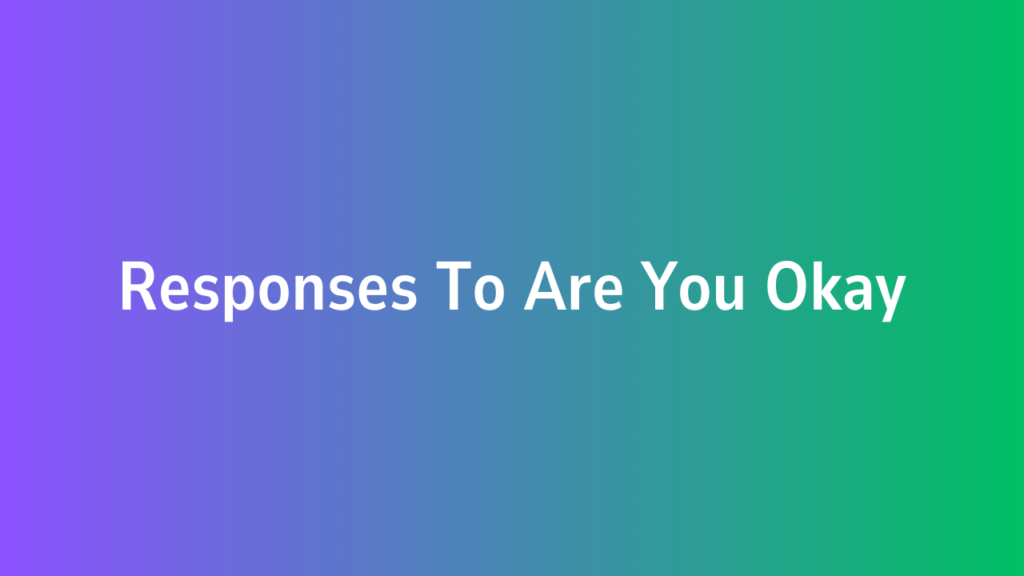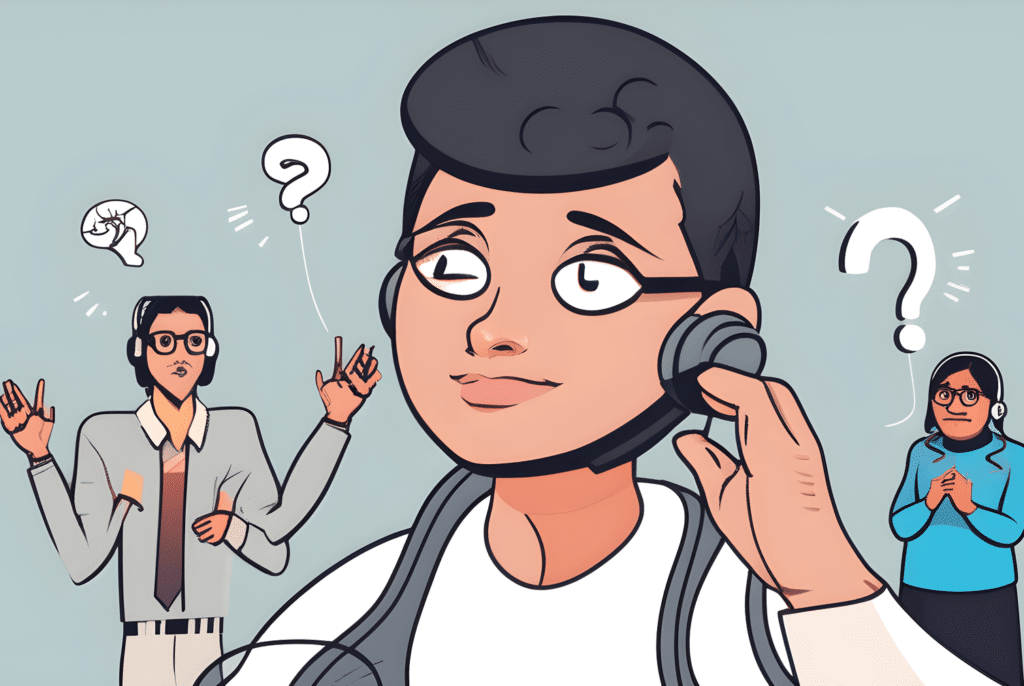At some point in life, most of us have been asked the question “Are you okay?” It’s a simple phrase that holds a lot of weight. Whether it’s asked by a friend, family member, coworker, or even a stranger, the question often indicates concern or care. But how do you respond? Sometimes, the answer is clear, but other times, it may not be so simple. In this blog post, we will explore different ways to respond to “Are you okay?” depending on your emotions, the situation, and the relationship with the person asking.
The Importance of “Are You Okay?”
Before diving into the different responses, let’s take a moment to understand the significance of the question. When someone asks you if you’re okay, it can mean different things in different contexts:
- Empathy and Concern: Often, people ask this question when they notice something might be off, such as a change in your mood or behavior. They might be concerned for your well-being.
- Social Courtesy: Sometimes, people ask “Are you okay?” as a form of politeness, even when they don’t know you well. This can be part of casual conversation, especially when they notice you seem a little out of sorts.
- Checking for Physical Injury: If you’ve been in an accident, hurt yourself, or seem unwell, people may ask to ensure you are not physically harmed.
Different Responses Based on Your Feelings
1. If You Are Okay and Want to Reassure Them
When you’re genuinely fine, but someone notices something that made them concerned, your response is about reassuring them. Here are a few responses to let them know you’re doing well:
- Simple Confirmation:
- “Yes, I’m good, thank you for asking!”
- “I’m fine, just a little tired. Appreciate you checking in!”
- Lighthearted Response:
- “I’m great! Just a little lost in thought.”
- “Yes, everything is going well, just caught up in something for a moment.”
These responses acknowledge the concern without going into unnecessary details, showing that you’re okay and grateful for the care. They can be great for situations where you don’t want to dwell on what might have caused worry but still want to make sure the person feels acknowledged.
2. If You Are Not Okay but Don’t Want to Talk About It
There are moments when you might not feel okay, but you’re not ready to open up or talk about the reasons behind it. It’s okay to express that. Here’s how to handle it:
- Deflecting Politely:
- “I’m not feeling my best today, but I don’t really want to get into it right now.”
- “I’m going through something, but I’d rather not discuss it at the moment.”
- Redirecting the Conversation:
- “I’m okay, just having a rough day. How are you doing?”
- “I’m fine, just dealing with some stuff. Let’s talk about something else.”
These responses let the other person know that while you appreciate their concern, you’re not ready or willing to talk about what’s bothering you. It’s okay to keep your boundaries in such situations.
3. If You Are Not Okay and Want to Talk About It
If you are not okay and are open to discussing it, the response is about inviting the other person into your emotional world. Here’s how you can open up:
- Honest Expression:
- “Actually, I’m not okay. I’ve been dealing with a lot lately, and it’s been hard.”
- “I’ve been feeling down for a while, but I’m glad you asked. I could use someone to talk to.”
- Request for Support:
- “I’m not doing well, and it feels good that you’re concerned. Can I talk to you about it?”
- “Honestly, I’m struggling. Can we sit down and talk? I need to get this off my chest.”
If you’re comfortable talking about your feelings, these responses invite help and understanding. Opening up can often lead to emotional relief and support from those who care about you.
4. If You Are Confused or Don’t Know How to Answer
Sometimes, you might not have a clear answer or might not even be sure of your emotions. In such cases, here’s how you can respond:
- Uncertain but Honest:
- “I’m not really sure… I’m feeling a bit off, but I can’t quite figure out why.”
- “Honestly, I’m kind of confused right now. I’m not sure how I’m doing.”
- Asking for Space to Think:
- “I’m not sure yet. I think I need some time to figure it out.”
- “I’m processing something, but I don’t have all the answers right now.”
These responses show that you’re still trying to work through your emotions and need time to reflect. It’s perfectly okay not to have everything figured out immediately.
5. If You Are Upset but Don’t Want to Show It
If you’re feeling upset but you don’t want to let it show, especially in a social or professional setting, you may opt for a more controlled response:
- Minimal Response:
- “I’m fine, just a little tired, thank you for asking.”
- “Yeah, I’m okay. Just a bit stressed, but I’ll be alright.”
- Deflecting with Humor:
- “Oh, you know, just the usual chaos. Nothing to worry about.”
- “I’m doing great—just pretending to be an adult today.”
These responses keep things light while giving a subtle indication that you might be going through something without fully opening up.
Responses for Different Scenarios
The way you answer “Are you okay?” can vary based on the setting and the relationship you have with the person asking. Below is a table summarizing possible responses in different contexts.
| Scenario | Response Options |
|---|---|
| Close Friend | – “I’m actually not doing great, can we talk about it?” – “Yeah, I’m okay, just a little off today.” |
| Family Member | – “I’m struggling a bit, but I don’t want to get into it now.” – “Thanks for asking. I’m fine, but could use some time to sort things out.” |
| Coworker | – “I’m okay, just a bit stressed with work today.” – “I’m doing alright. Just busy, thanks for asking!” |
| Stranger or Acquaintance | – “I’m fine, thank you for checking in.” – “I’m alright, just dealing with some stuff, but I appreciate your concern.” |
| Significant Other | – “I’m actually feeling a little down today. Can we talk later?” – “I’m not okay, but I’m glad you asked. Can I talk to you about it?” |
| In Public/While Socializing | – “I’m fine, just thinking about something. Thanks for asking.” – “Everything’s good, just a bit tired from the day.” |
Key Points to Remember When Responding
When asked “Are you okay?” it’s important to consider a few factors before responding:
- Your Emotional State:
- If you’re feeling overwhelmed, it’s okay to admit that. You don’t have to mask your emotions.
- If you’re not sure, it’s perfectly fine to say you need time to think.
- The Relationship with the Person:
- If it’s a close friend, family member, or partner, you may feel more comfortable sharing your emotions honestly.
- If it’s someone you don’t know well, you may choose a more neutral or polite response.
- Your Comfort Level:
- If you’re not comfortable sharing details, don’t feel pressured to do so. Set boundaries while expressing your gratitude for their concern.
- Timing and Context:
- If you’re in a social setting and you don’t want to make the conversation too heavy, a short, light response can be best.
- In private or one-on-one situations, you may feel more at ease discussing deeper feelings.
Conclusion: Understanding the Power of Asking and Responding
The question “Are you okay?” is a simple yet powerful way for people to show they care. It can serve as a reminder that we’re not alone in our struggles, whether they are big or small. How you respond depends on your feelings, your relationship with the person, and the situation at hand.
No matter your response, the most important thing is that you stay true to yourself. If you’re doing well, feel free to reassure the person. If you’re not feeling great, it’s okay to be honest—whether you’re ready to talk or not. By considering these different scenarios and responses, you can navigate this simple yet important question with confidence and self-awareness. Remember, it’s always okay to ask for help when you need it, and it’s also okay to keep your feelings private if that’s what makes you comfortable.



